During the height of the coronavirus outbreak, the Czech Republic was lauded for its widespread use of face masks and other practical measures to help curb the spread of COVID-19.
A number of Czech start-ups in the field of technology and innovation have also been developing smart solutions in an effort to help diagnose, prevent, or ease the physical and mental anguish of those who have contracted the disease.
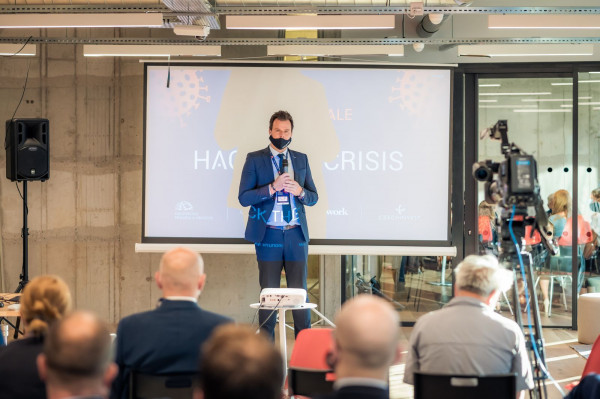
Last Monday, eight such projects were awarded funding as part of the Hack the Crisis hackathon, a joint initiative launched by CzechInvest and the Czech Ministry of Industry and Trade in April that encouraged local entrepreneurs to develop projects which showcase Czech ingenuity, largely in the healthcare sector.
The finals took place last week at Prague co-working space WeWork. Czech Prime Minister Andrej Babiš and Minister of Industry and Trade Karel Havlíček were in attendance as the jury selected the eight winning projects which will split CZK 10 million in prize money provided by Hyundai.
“I am very glad to have been able to meet and talk to the representatives of some of the best projects aimed at fighting the current crisis,” said PM Babiš. “I am also glad that – together with our partners from the private sector – we were able to support over one hundred companies and startups.”
More than four hundred unique projects were entered into the hackathon and the associated Czech Rise up program, which the PM acknowledged as “a simply incredible number.”
While only a handful of companies took home prize money, 108 of the total of 206 projects entered into the two-month-long hackathon have obtained some sort of financial support.
These are the winners to emerge from Hack the Crisis hackathon:
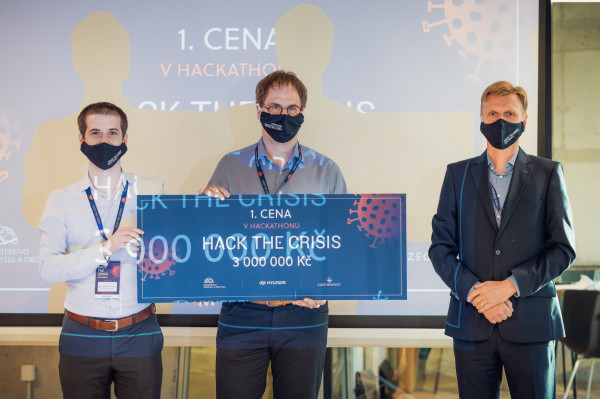
DIANA Biotechnologies, a company based in a biotechnology hub in Vestec near Prague was awarded a winning cash prize of CZK 3 million. The project, a series of ultra-sensitive diagnostic solutions, aims to contribute to the overall capacity of COVID-19 testing in the Czech Republic, which is critical for successfully lifting the quarantine measures, as well as fighting a possible new wave of infections in the future. It also managed to win the audience’s‘ sympathy’ award decided by a public poll on social media.
The second-place winner, receiving 2 million CZK in prize money was the Corovent open-source ventilator. The team behind the project consists of staff from the Faculty of Biomedical Engineering of the Czech Technical University, doctors from intensive care units, and specialists in production, pneumatic lines, electronics, logistics, and other fields. During the crisis, it was the only group in the world to create a mass-produced lung ventilator capable of saving patients with the most severe cases of COVID-19. The open-source design means the ventilator is intended to be used freely around the world.
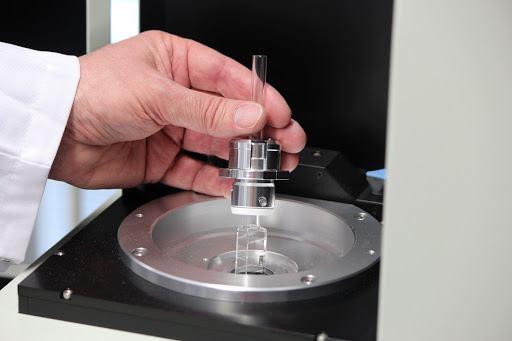
In third place, taking home a cash prize of CZK 1 million: LAM-X Active nano filters against COVID-19, a joint project of Charles University and its Academy of Sciences. The team is currently developing special nano filters that can be adapted for use as a component for masks. Not only does the active nano filter have the ability to capture a wide range of microorganisms, but once an innovative solution is added it allows microorganisms to be effectively and naturally eliminated following brief exposure to light. This notable feature makes the technology highly unique in its fight against coronavirus.
In addition, five projects were awarded special prizes of CZK 700,000 per project.
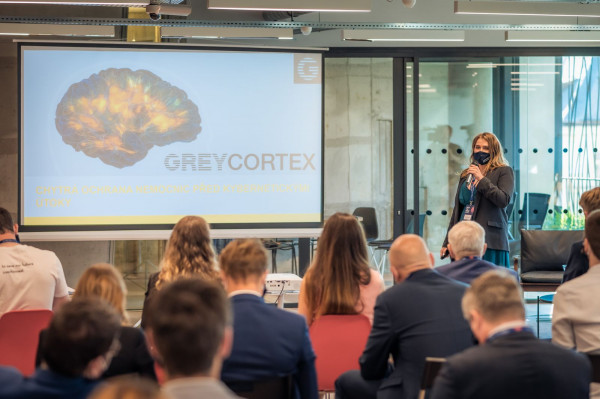
The Brno company Grey Cortex is standing up to cyber attacks in hospitals by developing a completely new generation of its GreyCortex Mendel Analyst which offers threat-detection and security solutions for critical infrastructure. Its latest solution surpasses the technical parameters of its current technology and can be used in the fight against cyberattacks not only in the Czech Republic but also worldwide. As a result, healthcare facilities can devote themselves fully to the work of treating patients and saving lives.
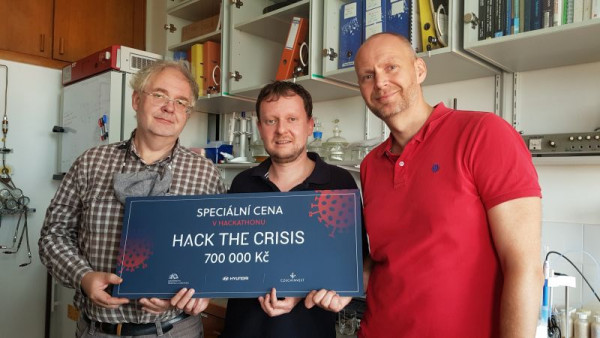
Improving or stabilizing the health of COVID-19 patients requires oxygen-enriched air. The Institute of Macromolecular Chemistry AS CR in cooperation with MemBrain s.r.o. has developed a device which can produce air with a high oxygen content, while also regulating its amount and concentration. The device helps doctors circumvent the need for using invasive mechanical lung intubation in patients. It is easily modifiable to compact and mobile versions, which allows its use in rescue vehicles, or in nursing homes, and can be safely operated by those without medical training.
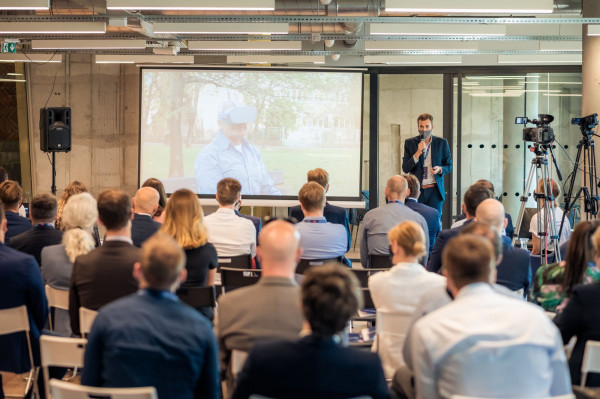
Many homes for the elderly and other care centers have become completely cut off from the rest of society due to the spread of the coronavirus epidemic, a factor that can lead to feelings of emotional isolation. The team from the Flying Kale organization, which specializes in virtual reality, has created the Kaleido project which offers Oculus Go virtual glasses to retirement homes. The glasses are equipped with special programs that simulate trips around the Czech Republic and throughout Europe. The aim is to make trips part of active therapy, as virtual reality stimulates the brain and could contribute to slowing the onset of dementia.

This app aims to help bridge the difficult period of isolation due to the spread of coronavirus with interactive, geolocation, and active games in which players solve a series of tasks and ciphers similar to an outdoor escape game. Developers want to turn distance learning, which can be boring for children, into something fun and attractive using social platforms. Students simply download the application and compete with each other; the app allows for a large number of users in one project. This virtual competition is aimed at motivating students to work together without having to sit side by side.
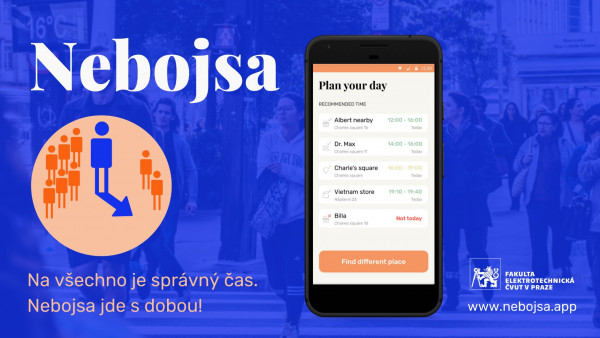
Researchers from the CTU chronorobotics laboratory are using artificial intelligence to combat the spread of coronavirus via the unique FreMEn contra COVID project, based on evidence that the virus spreads where people are concentrated. The Nebojsa application is capable of predicting the formation of crowds and queues in specific places for several days in advance. Users can determine at which time the biggest crowds are in a given place and plan their routes accordingly. Algorithms deployed and verified in social robotics are used for predictions. The tool is based on a combination of spacetime models used in intelligent robotics with infection risk models. The application is also designed to protect user privacy as only those interested can help with data collection anonymously through the FreMEn Explorer application.To read more about CzechInvest’s activities, visit its official website.












 Reading time: 5 minutes
Reading time: 5 minutes 






























